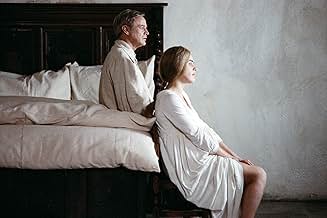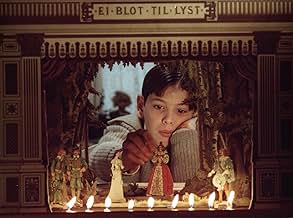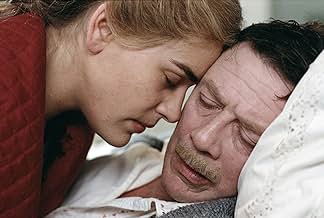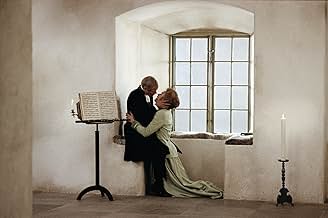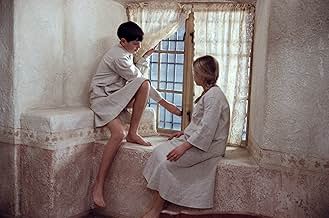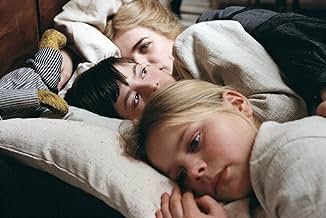Due bambini svedesi sperimentano i molti lati tragicomici della propria famiglia, gli Ekdahl.Due bambini svedesi sperimentano i molti lati tragicomici della propria famiglia, gli Ekdahl.Due bambini svedesi sperimentano i molti lati tragicomici della propria famiglia, gli Ekdahl.
- Vincitore di 4 Oscar
- 25 vittorie e 13 candidature totali
Patricia Gélin
- Staty - Ekdahlska huset
- (as Patricia Gelin)
Recensioni in evidenza
10anton-6
I have wanted to see this film for years but I have missed it several times they were showing it on television.And also because of my father does not like Bergman(why??) but still think that this film is fantastic.I saw it yesterday just after having read Bergman´s autobiography and this film is much a autobiographical film.
I would like to say something about the cinematography and acting.But what is there more to say about Sven Nykvist´s cinematography then MASTERFUL.Before I saw the film I read in a newspaper that this is the best Swedish acting film ever made and it was actually picked as number two as the best Swedish film ever made for a couple of years ago(film fans voted).The WHOLE cast acts SUPERB,I am not sure if I have ever seen anything more perfect.
This is a chronicle over a family.It has a a great poetic script that combines just as it sad in a other comment:striking visuals.Bergman has really done this to a masterpiece.Now I want to see the five-hour version(i saw the 3 hour version).Colorful,perfect,frightening and sometimes even funny.What I guess I liked most was that they showed everything from the children´s eyes.One of Bergman´s best.5/5
I would like to say something about the cinematography and acting.But what is there more to say about Sven Nykvist´s cinematography then MASTERFUL.Before I saw the film I read in a newspaper that this is the best Swedish acting film ever made and it was actually picked as number two as the best Swedish film ever made for a couple of years ago(film fans voted).The WHOLE cast acts SUPERB,I am not sure if I have ever seen anything more perfect.
This is a chronicle over a family.It has a a great poetic script that combines just as it sad in a other comment:striking visuals.Bergman has really done this to a masterpiece.Now I want to see the five-hour version(i saw the 3 hour version).Colorful,perfect,frightening and sometimes even funny.What I guess I liked most was that they showed everything from the children´s eyes.One of Bergman´s best.5/5
"Fanny and Alexander" (1982) was announced at the time of its release as Ingmar Bergman's swan song, his last film for the big screen. It is his most optimistic and enchanting blend of romance, tragedy, comedy, fantasy, and mysticism. Set in Sweden in the beginning of the 20th century, the film follows the lives and adventures of two children, brother and sister Fanny and Alexander Edkahl.
I love Bergman in every mood and in every genre - I love him dark, bleak, harrowing ("Shame"), mysterious ("Persona"), merciless and devastating ("Scenes from a Marriage, "Face to Face", "Autumn Sonata). I love his lighter, smiling side ("Wild Strawberries", "Smiles of a Summer Night). Even for a master of Bergman's powerful talent, "Fanny and Alexander" is extraordinary - a profound film which is also one of his most accessible works.
Pablo Picasso said once, "When I was 9 years old, I could paint like Rafael; as an adult, all my life I tried to learn how to paint like a child". In his final film, one of the greatest masters of dark and sometimes morose psychological studies looks at the world with a child's eye. The words he chose to finish his film with reflect the hope, the happiness and the magic that can be fully felt only in one's childhood: "...Anything can happen, anything is possible. Time and space do not exist. ..On a flimsy ground of reality, imagination spins out and waves new patterns." --- August Strindberg's introductory notes for A Dream Play.
I love Bergman in every mood and in every genre - I love him dark, bleak, harrowing ("Shame"), mysterious ("Persona"), merciless and devastating ("Scenes from a Marriage, "Face to Face", "Autumn Sonata). I love his lighter, smiling side ("Wild Strawberries", "Smiles of a Summer Night). Even for a master of Bergman's powerful talent, "Fanny and Alexander" is extraordinary - a profound film which is also one of his most accessible works.
Pablo Picasso said once, "When I was 9 years old, I could paint like Rafael; as an adult, all my life I tried to learn how to paint like a child". In his final film, one of the greatest masters of dark and sometimes morose psychological studies looks at the world with a child's eye. The words he chose to finish his film with reflect the hope, the happiness and the magic that can be fully felt only in one's childhood: "...Anything can happen, anything is possible. Time and space do not exist. ..On a flimsy ground of reality, imagination spins out and waves new patterns." --- August Strindberg's introductory notes for A Dream Play.
I am not one for putting up idols on pedestals; mostly Bergman's films leave me tepid or even cold. But Fanny och Alexander is a splendid production, beautifully made, so superb it even evokes feelings of having come from a novel. Excellent characterization throughout, all the way down the cast, lending that magic touch to the costuming of the early 1900s. Mesmerising throughout, the film is not a single minute too long. The development of the story-line is superbly handled in an absorbing and coherent manner, manifesting the great empathy between director and actors. If the cinematography is visual poetry, the script is philosophical and full of awareness or consciousness of things in life, but not at a pretentious, abstract and theoretical level, but at a real human dimension.
If you only have 10 videos in your collection, Fanny och Alexander should be one of them. My vote is a bit higher than the IMDb average.
These comments refer to the 3-hour version.
If you only have 10 videos in your collection, Fanny och Alexander should be one of them. My vote is a bit higher than the IMDb average.
These comments refer to the 3-hour version.
It's the disclosure of disfunction to children's eyes, the discovery of a world not conceived, or indeed anticipated, a contract broken, of barriers erected and bolstered, mistrust, disbelief and, perhaps more importantly, the formation and flowering of the unique specimen you are likely to become as a result. Film making is not just an exploration of its characters and creators but, more usually, an exploration of you! and how you scale against its mirrors and answer its questions? Why else would you invest so much time into discovering your difference and why you're so resistant to change?
Fanny and Alexander (1982)
**** (out of 4)
The first two words that popped into my mind as the end credits rolled was masterpiece and epic but in some ways I think both of those words are too small to give proper credit to this film. Originally this was meant to be Bergman's swan song and while I would have been a great film to go out on, I'm glad he eventually returned to the director's chair a couple times. This film, running nearly five hours in its complete form, is certainly one of the most beautiful movies that I've ever seen. The technical side of things are downright brilliant but the incredible screenplay and performances make this one of the greatest achievements ever captured on film. The screenplay offers up so much detail and so much thought on so many topics that it's hard to really make your mind up about the film but I'm sure this is the type of movie that a hundred people could watch and they'd all walk away with different feelings and emotions about what it all meant.
For me personally, I think the film is about everything possible, from life to death to love to religion and most importantly to imagination. The movie tackles all sorts of subjects, which were very familiar to Bergman and that's why I'd call this a greatest hits type of packaging from the director. We have issues dealing with death, which we saw in Cries and Whispers. We have the ideas of religion and what it means via his trilogy including Winter Lights. We have ideas of the theater, which the director hit upon in many of his overlooked gems from the 1970's. We also have the beauty of life and love, which we've seen several times from the master.
On the technical side of things there's a lot to admire here. The visual look is quite striking and breathtaking especially the early sequences with the frozen river. The love how the first third of the movie, with the family together, is shown in very rich and vivid colors that really brings out a warm feeling of family and comfort. The middle stuff with the bishop changes to pale colors, which really brings out the coldness of all the characters during this time. We then shift to the grandmother's house, which is full of spring like colors, which offer up a sense of safety. The cinematography by Sven Nykvist really is something to watch as he perfectly captures every mood, feeling and thought going on within the film. He, like the director, was already considered a master by the time this film was released and this movie just adds to his legendary status.
The performances are among some of the greatest I've ever seen. I think the standout performance of the film belongs to Jan Malmsjo as the evil bishop. If this isn't one of the greatest villains in film history then I'm not sure how you would define the term villain. What really impressed me about Malmsjo is his utter coldness whenever he talks, walks or whenever we simply see him thinking. The boy-faced nature on the outside also makes us, at times, feel for him and want to like him but that coldness and evilness is always right there to remind us what a snake he is. Jarl Kulle is also worth pointing out as the loverboy/brother who has a terrific scene where he squares off against Malmsjo in an attempt to get the children back. The outright anger and frustration the actor shows in this scene is very chilling and one can't help but understand and feel everything he's doing. Ewa Froling is also terrific as Emile and the strength she brings to her character ranks this as one of the greatest performances I've seen from any actress. Bertil Guve is also worth mentioning as Alexander. He doesn't have too much to say but it's rather amazing how much Bergman got out of the young actor just by his facial gestures and body movements.
The screenplay is another thing as beauty as, for the most part, we get all dialogue but the dialogue is so well written that all of the heart, sadness and fear comes from it. There are some rather hard to watch scenes including one involving a cane, which is used to beat on of the children. I couldn't help but jump every time the cane hit the body because the screenplay sets up the evilness of the bishop so well that this scene contains alternate emotions. We also have great talk about the meaning of fact and an illusion, which includes talk of actors and how they react to real situations. There's also a great conversation about the Jewish family, being magicians and what effect this has on their theories of God. Then, there's the religious aspect, which Bergman once again attacks with questions and thoughts about the truth behind a higher being. In reality, I believe this film is about the two kids but mainly everything is seen through the eyes of Alexander. All of the subjects hinted at and talked about throughout the film are from a child's eyes and this is something brave to try from Bergman. The honesty and wild wonder of a child's questions are really, to me, what this film is all about and it's brilliantly done by the great director. There are even sequences with Alexander seeing ghosts with a running theme of if he is really seeing them or if they are just in his head.
What's most amazing is that the film runs five hours yet there isn't a single second of the film where the viewer can get bored. There's so much drama, pain, laughter and fears that this carries the film the entire running time and I really wish the film had gone on another five hours.
**** (out of 4)
The first two words that popped into my mind as the end credits rolled was masterpiece and epic but in some ways I think both of those words are too small to give proper credit to this film. Originally this was meant to be Bergman's swan song and while I would have been a great film to go out on, I'm glad he eventually returned to the director's chair a couple times. This film, running nearly five hours in its complete form, is certainly one of the most beautiful movies that I've ever seen. The technical side of things are downright brilliant but the incredible screenplay and performances make this one of the greatest achievements ever captured on film. The screenplay offers up so much detail and so much thought on so many topics that it's hard to really make your mind up about the film but I'm sure this is the type of movie that a hundred people could watch and they'd all walk away with different feelings and emotions about what it all meant.
For me personally, I think the film is about everything possible, from life to death to love to religion and most importantly to imagination. The movie tackles all sorts of subjects, which were very familiar to Bergman and that's why I'd call this a greatest hits type of packaging from the director. We have issues dealing with death, which we saw in Cries and Whispers. We have the ideas of religion and what it means via his trilogy including Winter Lights. We have ideas of the theater, which the director hit upon in many of his overlooked gems from the 1970's. We also have the beauty of life and love, which we've seen several times from the master.
On the technical side of things there's a lot to admire here. The visual look is quite striking and breathtaking especially the early sequences with the frozen river. The love how the first third of the movie, with the family together, is shown in very rich and vivid colors that really brings out a warm feeling of family and comfort. The middle stuff with the bishop changes to pale colors, which really brings out the coldness of all the characters during this time. We then shift to the grandmother's house, which is full of spring like colors, which offer up a sense of safety. The cinematography by Sven Nykvist really is something to watch as he perfectly captures every mood, feeling and thought going on within the film. He, like the director, was already considered a master by the time this film was released and this movie just adds to his legendary status.
The performances are among some of the greatest I've ever seen. I think the standout performance of the film belongs to Jan Malmsjo as the evil bishop. If this isn't one of the greatest villains in film history then I'm not sure how you would define the term villain. What really impressed me about Malmsjo is his utter coldness whenever he talks, walks or whenever we simply see him thinking. The boy-faced nature on the outside also makes us, at times, feel for him and want to like him but that coldness and evilness is always right there to remind us what a snake he is. Jarl Kulle is also worth pointing out as the loverboy/brother who has a terrific scene where he squares off against Malmsjo in an attempt to get the children back. The outright anger and frustration the actor shows in this scene is very chilling and one can't help but understand and feel everything he's doing. Ewa Froling is also terrific as Emile and the strength she brings to her character ranks this as one of the greatest performances I've seen from any actress. Bertil Guve is also worth mentioning as Alexander. He doesn't have too much to say but it's rather amazing how much Bergman got out of the young actor just by his facial gestures and body movements.
The screenplay is another thing as beauty as, for the most part, we get all dialogue but the dialogue is so well written that all of the heart, sadness and fear comes from it. There are some rather hard to watch scenes including one involving a cane, which is used to beat on of the children. I couldn't help but jump every time the cane hit the body because the screenplay sets up the evilness of the bishop so well that this scene contains alternate emotions. We also have great talk about the meaning of fact and an illusion, which includes talk of actors and how they react to real situations. There's also a great conversation about the Jewish family, being magicians and what effect this has on their theories of God. Then, there's the religious aspect, which Bergman once again attacks with questions and thoughts about the truth behind a higher being. In reality, I believe this film is about the two kids but mainly everything is seen through the eyes of Alexander. All of the subjects hinted at and talked about throughout the film are from a child's eyes and this is something brave to try from Bergman. The honesty and wild wonder of a child's questions are really, to me, what this film is all about and it's brilliantly done by the great director. There are even sequences with Alexander seeing ghosts with a running theme of if he is really seeing them or if they are just in his head.
What's most amazing is that the film runs five hours yet there isn't a single second of the film where the viewer can get bored. There's so much drama, pain, laughter and fears that this carries the film the entire running time and I really wish the film had gone on another five hours.
Lo sapevi?
- QuizAt the time, the largest film production ever in Sweden (with 60 speaking parts and over 1200 extras) and the most expensive, with a budget of $6 million.
- BlooperAmong the Christmas decorations in the Ekdahl house, there is a garland of miniature flags of the Nordic countries, including the Finnish flag. The Finnish flag was in fact only designed and adopted after Finnish independence in 1917, a decade after the events of the film.
- Citazioni
Ekdahlska huset - Helena Ekdahl: Everything can happen. Everything is possible and probable. Time and space do not exist. On a flimsy framework of reality, the imagination spins, weaving new patterns.
- Versioni alternativeTheatrical version is 188 minutes long. The TV mini-series version is 312 minutes long.
- ConnessioniEdited into Fanny & Alexander (1983)
I più visti
Accedi per valutare e creare un elenco di titoli salvati per ottenere consigli personalizzati
Dettagli
- Data di uscita
- Paesi di origine
- Lingue
- Celebre anche come
- Fanny e Alexander
- Luoghi delle riprese
- Aziende produttrici
- Vedi altri crediti dell’azienda su IMDbPro
Botteghino
- Budget
- 6.000.000 USD (previsto)
- Lordo Stati Uniti e Canada
- 6.783.304 USD
- Lordo in tutto il mondo
- 6.813.882 USD
- Tempo di esecuzione3 ore 8 minuti
- Mix di suoni
- Proporzioni
- 1.66 : 1
Contribuisci a questa pagina
Suggerisci una modifica o aggiungi i contenuti mancanti



